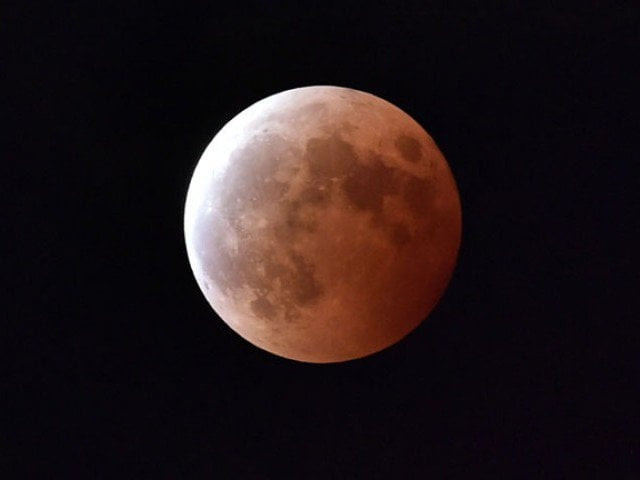Century's longest blood moon dazzles Karachiites
Lunar eclipse continues for a record 102 minutes and 57 seconds

Blood moon dazzles Karachiites. PHOTO: FILE
The lunar eclipse continued for a record 102 minutes and 57 seconds. However, the complete lunar eclipse could not be seen due to mist and a cloudy environment.
Former KU vice-chancellor Professor Dr Zafar Saifi, Professor Dr Aurangzeb Hafi, Dr Umar Farooq of Dow University of Health Sciences and ISPA Director Javed Iqbal were among those who attended.
Dr Hafi confirmed that this was the longest lunar eclipse of the century, which lasted for 102 minutes and 57 seconds. He said it could not be seen completely due to cloudy weather.
Blood moon to dominate night sky in longest lunar eclipse of 21st Century
Sea water from Keamari was also examined during the lunar eclipse. Dr Farooq said that changes in the moon cycle impacts the sea behaviour. On the 14th date of the moon cycle, the water level rises and the tides are fast.
He said that the same changes take place during a lunar eclipse as the ones that are witnessed during the dates of the normal moon cycle. However, he said that during a lunar eclipse these changes come within hours instead of days. He said that all the changes seen within 30 days were seen within 102 minutes during the lunar eclipse.
Dr Saifi maintained that there were no shortcomings in our scientists and claimed that they could work up to the global level if provided with good instruments. He said ISPA needed new and advanced equipment.
Pakistan to witness century’s longest lunar eclipse today
He said that Dr Hafi not only observed the lunar eclipse by traveling on a plane at a height of 10,000 feet but also took pictures of it. This kind of observation is very important because a new thing can be discovered at any time, he said.
"The moon looked like a blood-moon due to the sun rays," said Iqbal, explaining that the complete moon eclipse occurs when the earth comes in between the sun and the moon during its rotation.
Mostly, a lunar eclipse occurs twice or thrice a year, but this one will be rare owing to its long duration and visibility across the globe, he said.



















COMMENTS
Comments are moderated and generally will be posted if they are on-topic and not abusive.
For more information, please see our Comments FAQ